September 2025
The U.S. parking management market is set to grow from USD 1.86 billion in 2025 to USD 4.17 billion by 2034, with an expected CAGR of 9.40% over the forecast period from 2025 to 2034. The U.S. parking management market is expanding due to urbanization, increased vehicles on the road, and a general need to improve traffic congestion in urban centers. Smart parking infrastructure that incorporates sensors, mobile applications, and cashless payments for users is now in increasing demand, particularly in large urban cities such as New York, Los Angeles, and Chicago.
In addition, the application of federal and municipal regulations that guide the use of parking space and environmentally friendlier modes of transportation to improve sustainability efforts in cities is also a factor, alongside investment in advanced parking outlets by airports, malls, and office complexes to enhance parking efficiency. Along with other IBMS solutions on the rise, the increase in the number of electric vehicles on the road is an additional aspect related to parking management systems.
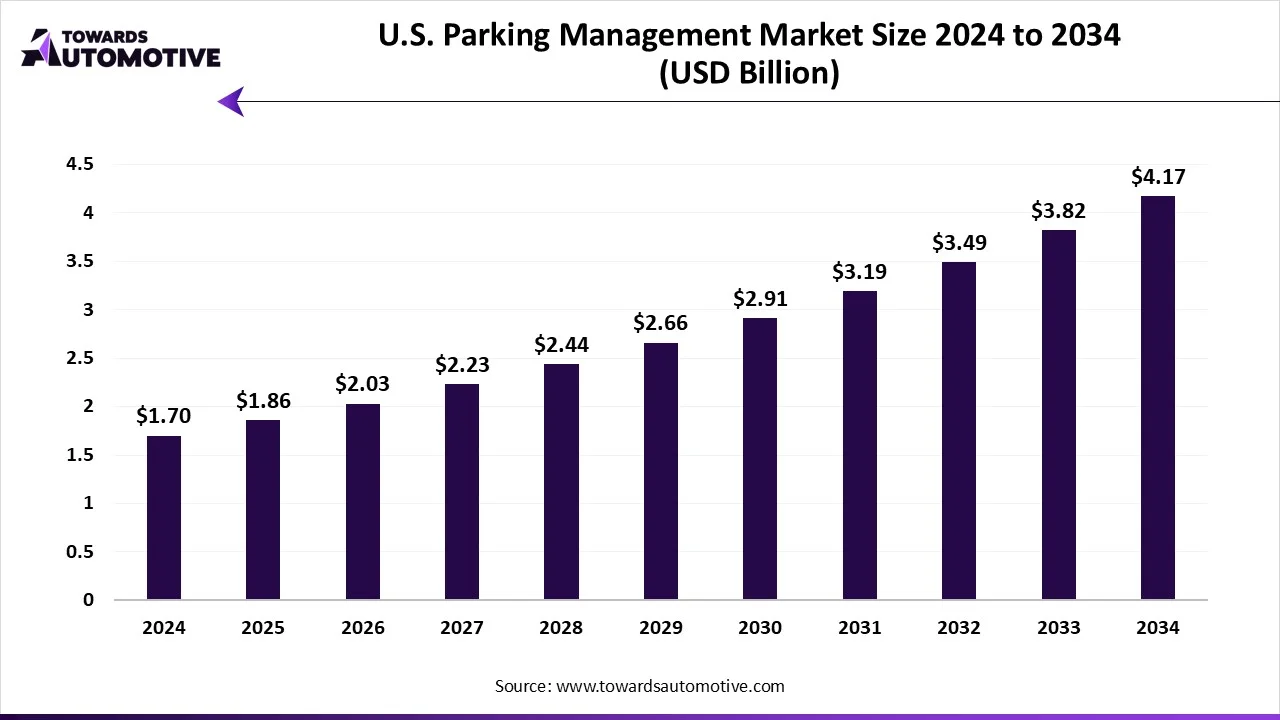
The U.S. parking management market refers to systems, solutions, and services designed to efficiently manage parking spaces, traffic flow, and revenue collection in urban, commercial, and residential areas. It encompasses hardware, software, and services for smart parking, automated ticketing, mobile payment, access control, enforcement, and analytics to enhance operational efficiency, reduce congestion, and improve the user experience. The parking types in the U.S. on which parking management is utilized comprise on-street parking, off-street parking (multi-level / surface lots), private/corporate parking, and airport & transit parking. The end-users in the market include municipal/government authorities, commercial complexes & malls, airports & transportation hubs, hospitals & healthcare facilities, and residential complexes. As cities continue to get more congested, parking management helps alleviate traffic congestion and more effectively utilize the space. The demand for parking management systems and services is on the rise, spurred by technology advancements with smart city projects, the increasing number of cars on the roads, and the increasing trend for digital payment, making parking management a basic urban service.
The trends in the market are partnership, product launches, and innovative program launches.
AI has significantly improved the U.S. parking management sector by improving the efficiency and speed of parking activities. Sensors and cameras operated by AI can monitor the availability of real-time open parking spaces and guide drivers to them, which reduces traffic and fuel consumption generated by circling drivers. In addition, AI systems also facilitate open parking options available through license plate scanning recognition, providing a seamless entrance and exit process without tickets or cash. Parking charge operators utilize AI systems to analyse existing charges in data and estimate demand, which supports in developing dynamic pricing, managing oversupply, or scarcity of spaces. Moreover, it integrates with the mobile applications of customers for bookings and payments. Improvements to the customer experience, and more effective management of the increasing number of cars in urban centres, help in the increase in use of AI in parking management solutions across the U.S.
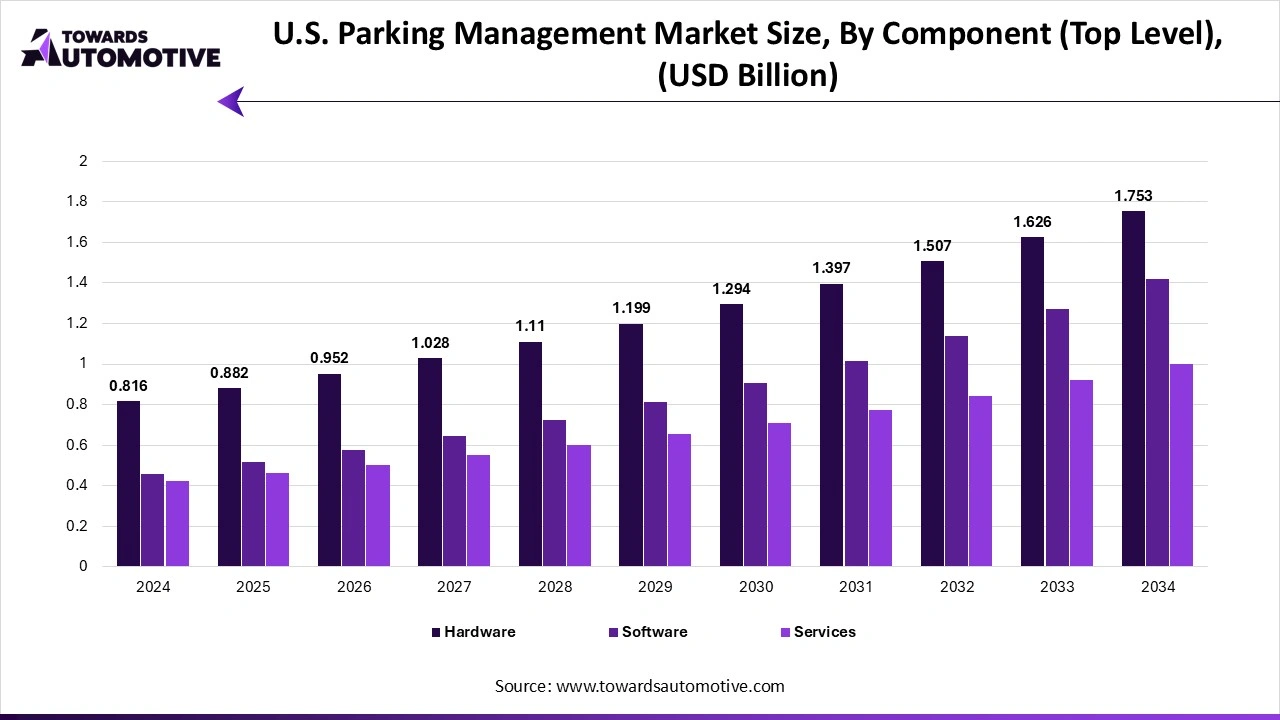
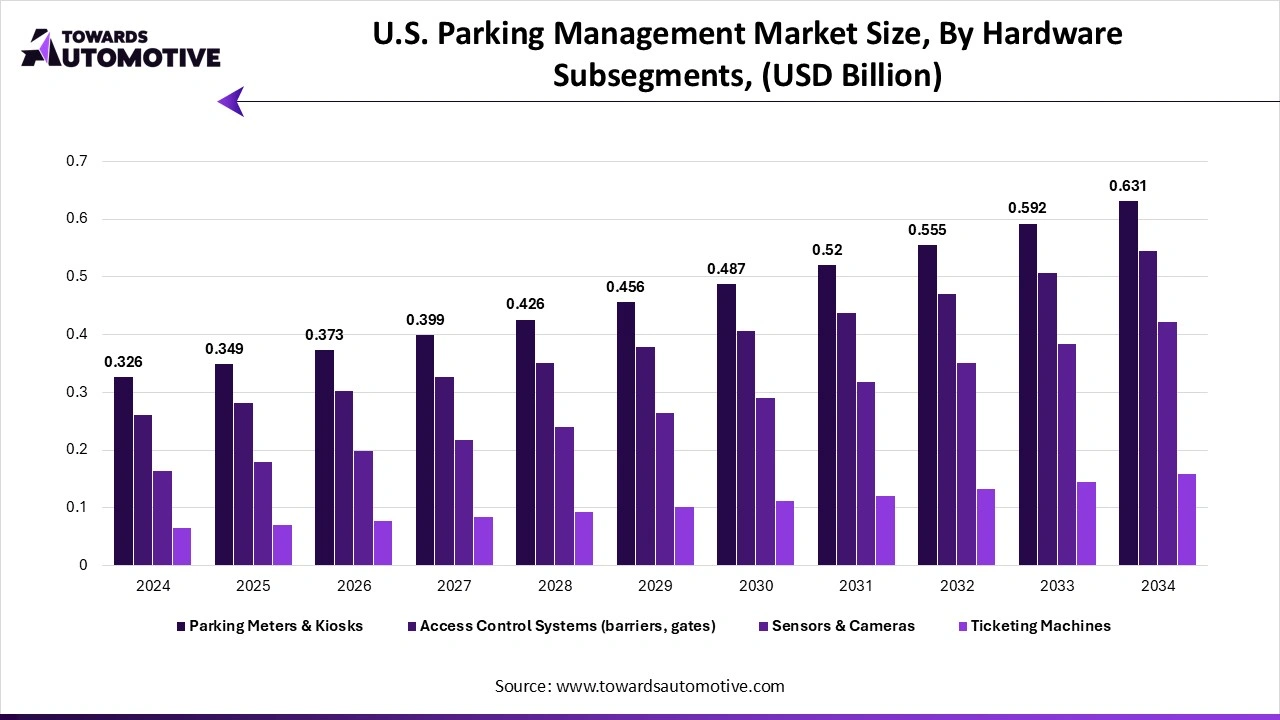
The hardware segment dominated the U.S. parking management market as monitoring and controlling vehicles in real-time requires the utilization of equipment, including sensors, cameras, automated gates, smart meters, and payment machines. Accountable municipalities add equipment and further upgrade the equipment to build out more convenient on-street and off-street parking. With the rising vehicle ownership, more parking infrastructure will be needed, indicating a continuous stream of projects where hardware will be required. Even with improved software and administration, hardware must often first be used as a means to collect the necessary and real data needed to improve and to support automated processes based on that data. Furthermore, airports, malls, and municipalities typically make a significant investment in hardware solutions, ensuring their parking operates smoothly.
The software segment is expected to be the fastest-growing segment in the forecasted period, as digital platforms are very important in the modern parking environment. The software will facilitate cloud-based management, mobile payments, booking applications, and AI-powered analytics functionality. As growing numbers of U.S. cities pursue smart city projects, operators are gravitating toward software solutions that allow operators to monitor parking spaces in real-time, utilize dynamic pricing, and perform predictive analytics. Moreover, software solutions are also appealing to both public and private operators as they are more cost-effective in relation to most software and hardware upgrades, especially with the growing utilization of contactless payments and app-based reservation systems. Software will continue to capture the market presence, simply because of the digital transformation underway. Software proves to be an excellent component for enhancing operating efficiencies, flexibility, and improved user experience.
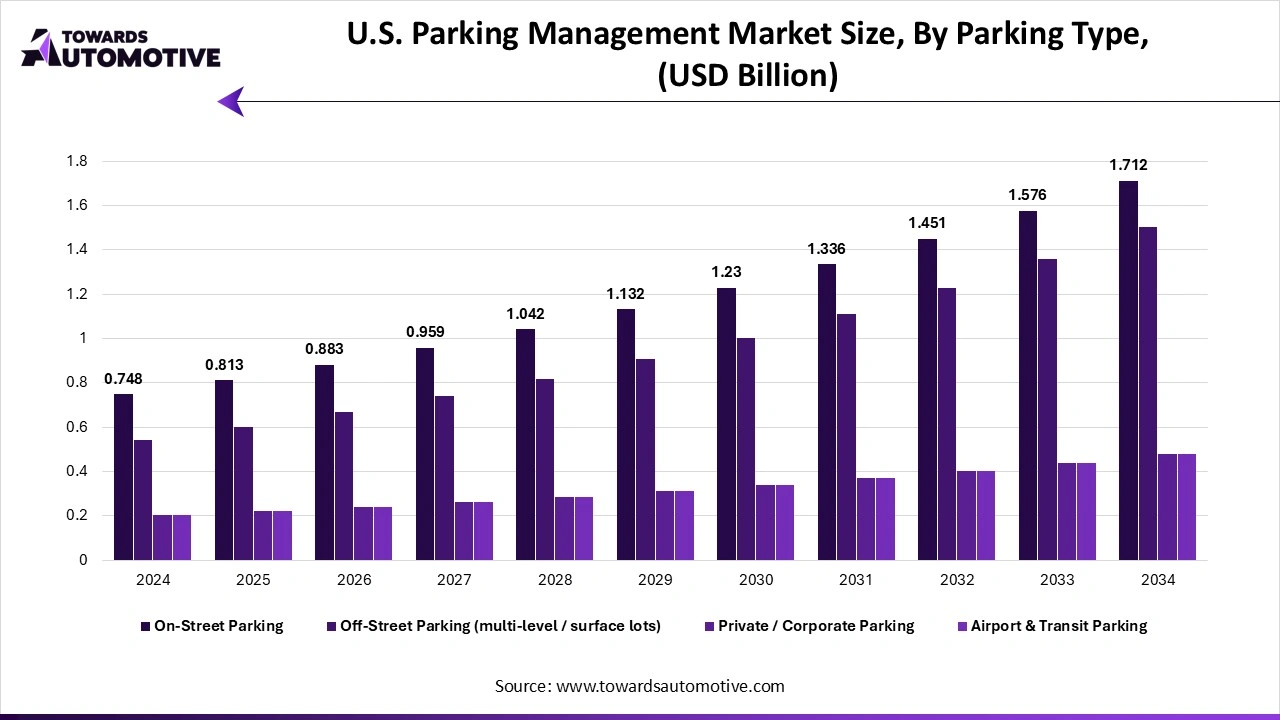
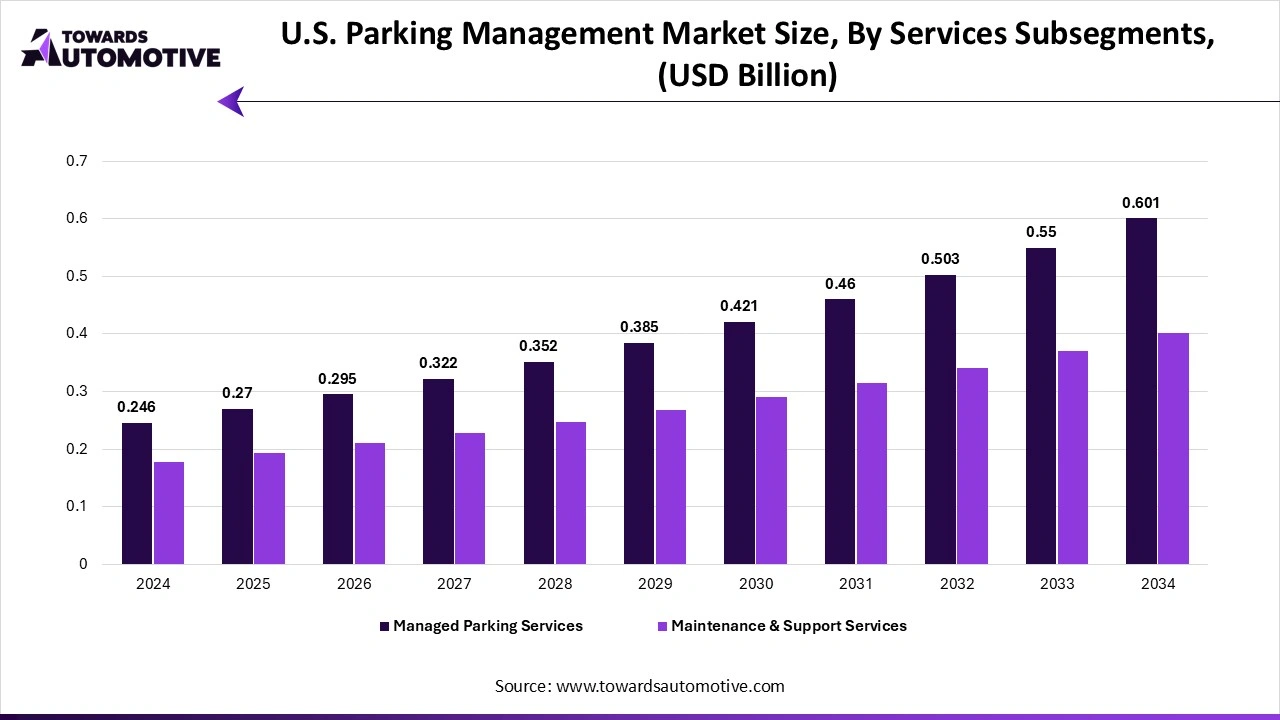
The on-street parking segment dominated the market because on-street parking is often the most prevalent type of parking in urban contexts. For instance, major urban centers such as New York, San Francisco, and Chicago have streets with metered or permit-based on-street parking systems for the purposes of managing vehicle flow and revenue generation. Regulators have significant oversight of on-street parking to reduce congestion and stimulate parking turnover. Drivers favor on-street parking in urban centers because of the convenience, proximity to destination (e.g., shopping, work), and high-speed turnover associated with it. Although smart meters or other enforcement practices contribute to the popularity of on-street parking as well. Since cities in the U.S. prioritize managing available curbspace efficiently, on-street parking will continue to be the largest use in the parking market.
The off-street parking segment is expected to be the fastest-growing segment in the U.S. parking management market, with a growing demand for these structures and the provision of safe parking facilities in the U.S. As urban areas become more congested, multi-story garages, private lots, and underground parking facilities serve as reliable alternatives to parking on the street. Additionally, in an effort to accommodate the increase in the number of parked vehicles, airports, malls, stadiums, and office complexes are developing off-street facilities that incorporate automated technology, security cameras, and EV charging stations. Rising vehicle ownership and creating a sense of security are driving the demand for safe parking and will drive off-street parking demand. This growth is also a result of ride-share services and direct delivery processes, eliminating the necessity for on-street parking. Moreover, these developments also qualify the category of off-street parking under municipal or urban planning policies that encourage more efficient use of land, which would then include off-street parking infrastructure.
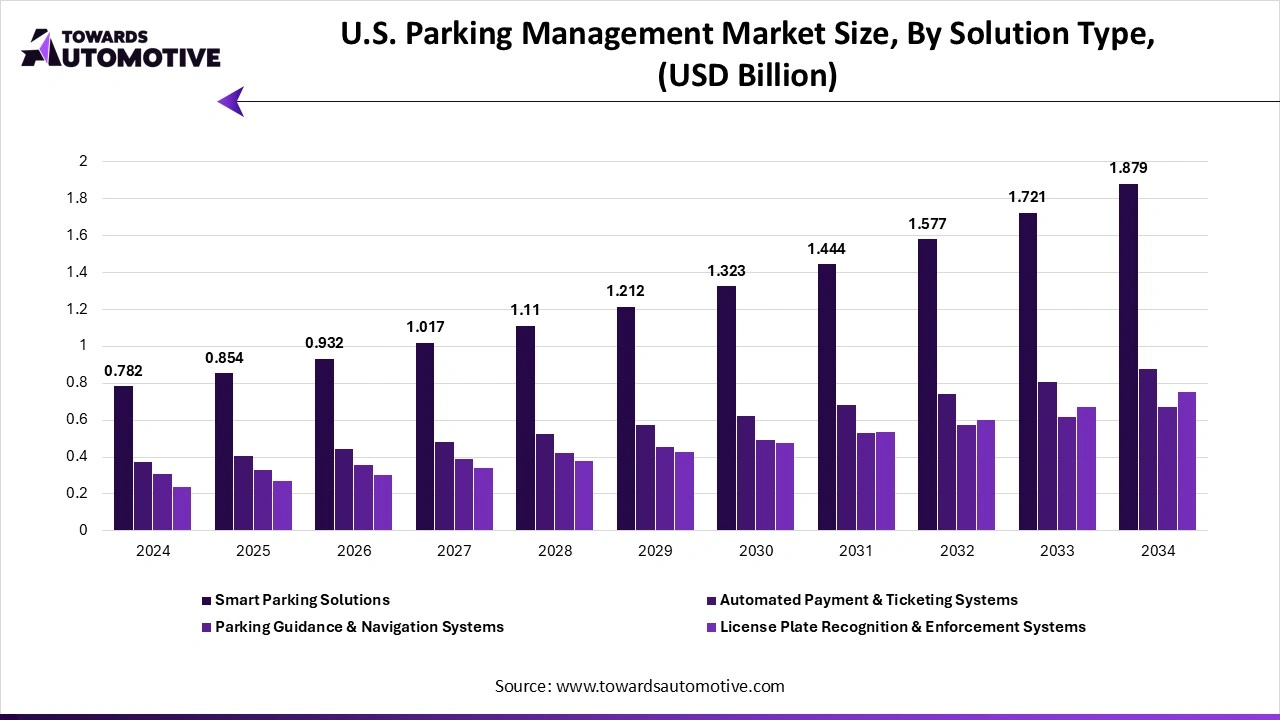
The smart parking solutions segment led the market. Smart parking alternatives lead the U.S. market as they offer up-to-date availability, as well as mobile payments, and overall end-user experience. Smart parking alternatives leverage IoT sensors, cameras, and cloud platforms to efficiently assist drivers with finding open spaces and, ultimately, decrease overall vehicular congestion. As cities in the United States are developing smart city initiatives, smart parking remains at the forefront of the evolving ecosystem of improving smart city mobility. Cities, municipalities, airport authorities, and private businesses/designated operators in parking management prefer smart parking solutions because they are efficient, good for the bottom line, and leverage data to help decision making. Consumers also realize positive outcomes from the convenience and speed of smart parking. Overall, as demand continues for digitization and convenience, smart parking solutions have captured, and will continue to capture, the leading position in the evolving U.S. market.
The license plate recognition & enforcement systems segment is expected to grow at the fastest rate in the forecasted period because LPR recognizes the vehicle license plate and does not require the user to have a physical ticket or pass, which reduces human error and operates at a lower cost. Municipalities to monitor license plate recognition technology to improve compliance, enforce time limits, and limit illegal parking. LPR systems also improve public safety because they can track the location of vehicles in real time. To further support this market, currently, LPR has become more precise and affordable, given advancements in artificial intelligence and in machine vision. The technology is particularly appealing to airports, government authorities, and private parking operators, thus increasing the demand for this technology within the U.S. and fostering rapid adoption.
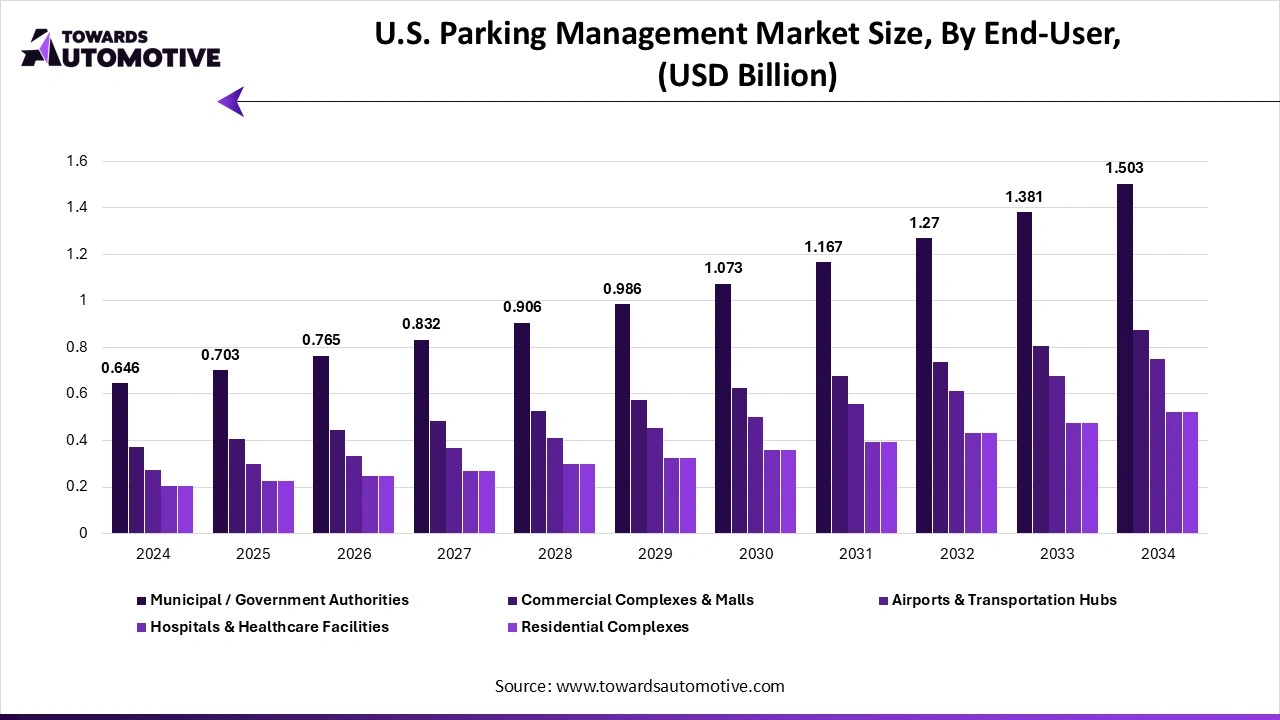
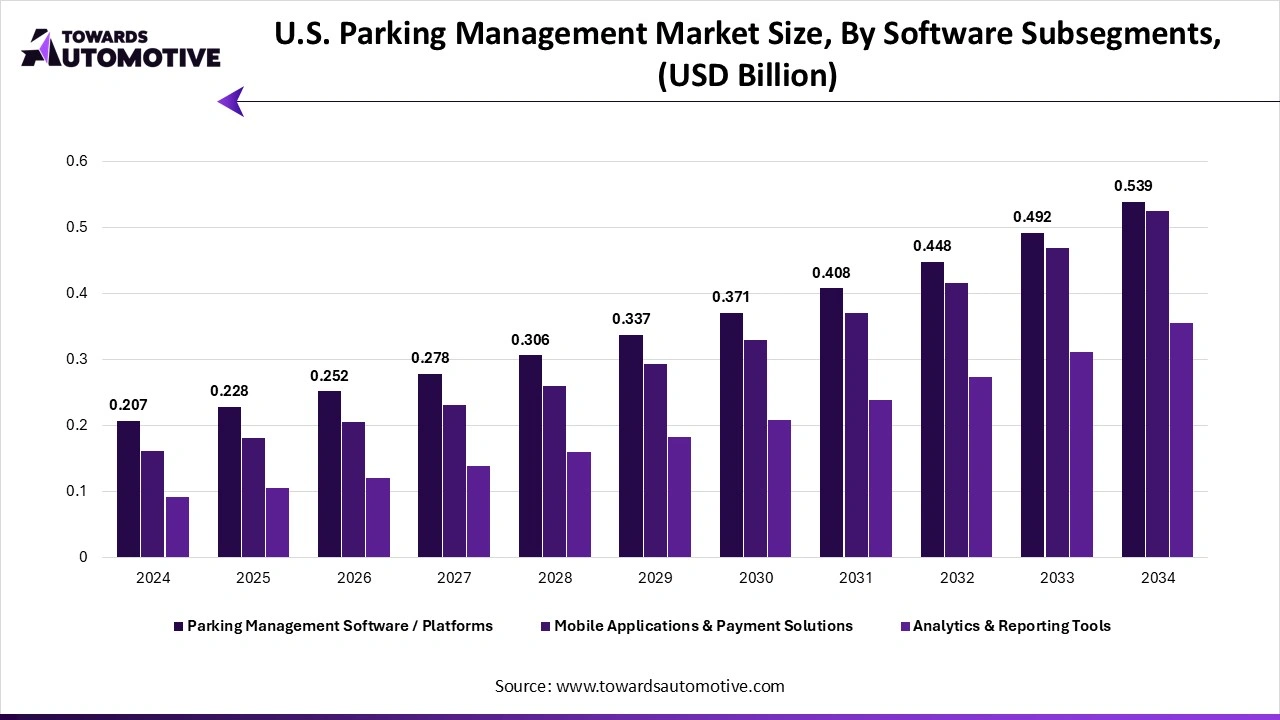
The municipal / government authorities segment led the U.S. parking management market because they have authority over a vast majority of on-street and public parking across the country. The cities and local governments utilize parking management in their objectives for regulated traffic, reduction of city congestion, and for revenue. They have large budgets in place and are deploying smart parking technologies in their smart cities initiatives. Public spaces, like streets downtown, parks, and government buildings, are all public spaces managed by local authorities, making them the largest buyers of hardware, software, and enforcement options. Their outreach and planning efforts in cities ensure that municipal authorities will remain the leading end-users.
The airports & transportation hubs segment is expected to grow at the fastest rate in the U.S. parking management market because higher passenger volume creates a greater need for advanced parking management. U.S. airports are spending money on smart systems that can provide terminal and parking garage real-time parking availability, online reservations, dynamic pricing, EV charging options, etc. Additionally, transportation hubs such as train and bus stations require effective parking management for commuter parking and rideshare/taxicab. As demand for air travel and passenger traffic has increased, airports have upgraded their parking stalls to offer enhanced convenience while also generating revenue. With the demand for seamless travel experience and improved operating efficiency currently at an all-time high, airports and transit centers have been rapidly expanding their use of parking management systems.
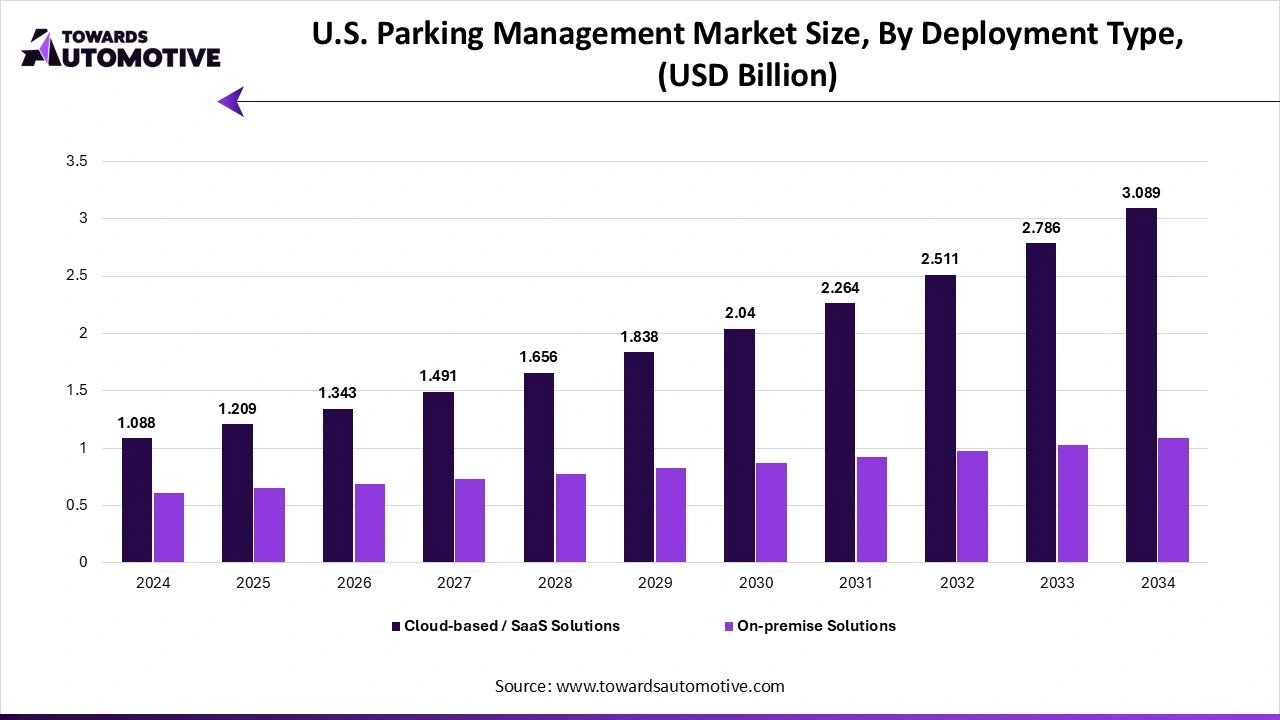
The cloud-based / SaaS segment dominated and is expected to be the fastest-growing segment in the market because they are scalable, provides real-time access to data, and, most importantly, incurs lower upfront capital costs than older, legacy systems. SaaS is preferred by operators in the U.S. when it provides the option to manage multiple sites from a single platform and when the operator can update systems remotely. Cloud-based solutions also easily integrate with mobile applications, digital payment options, and AI, data analytics, and reporting, which are deemed essential for parking management in urban cities. Moreover, cloud-based solutions are easy to integrate and deploy whilst reducing the need for expensive or custom hardware (which requires storage) and eliminating the IT burden for maintenance when leveraging a SaaS platform. With the ongoing push of smart city infrastructure development, SaaS platforms remain the most attractive, flexible, and future-ready, which is a primary reason why cloud-based solutions continue to dominate the market as a current leader and fastest-growing deployment option.
The on-premise solutions segment is expected to grow at a considerable rate in the forecasted period. The growth of substantial on-premise solutions is expected to continue at a stable rate because certain U.S. operators even now prefer greater research control; this has been especially true for government agencies and municipalities. Due to sensitive data associated with vehicles and payments, municipalities/airports prefer on-premise solutions because they feel local control of their systems enhances security. Similar practice exists in large facilities and institutions, such as hospitals and universities, that prefer to avoid depending on any vendor's server. While we are seeing an uptick in cloud systems, many of these institutions continue to upgrade and replace on-premises solutions to address compliance, privacy, and reliability of their applications, data, and facilities. This balanced focus on safety, independence, and security will ensure that on-premise solutions will experience considerable growth into the forecast period.
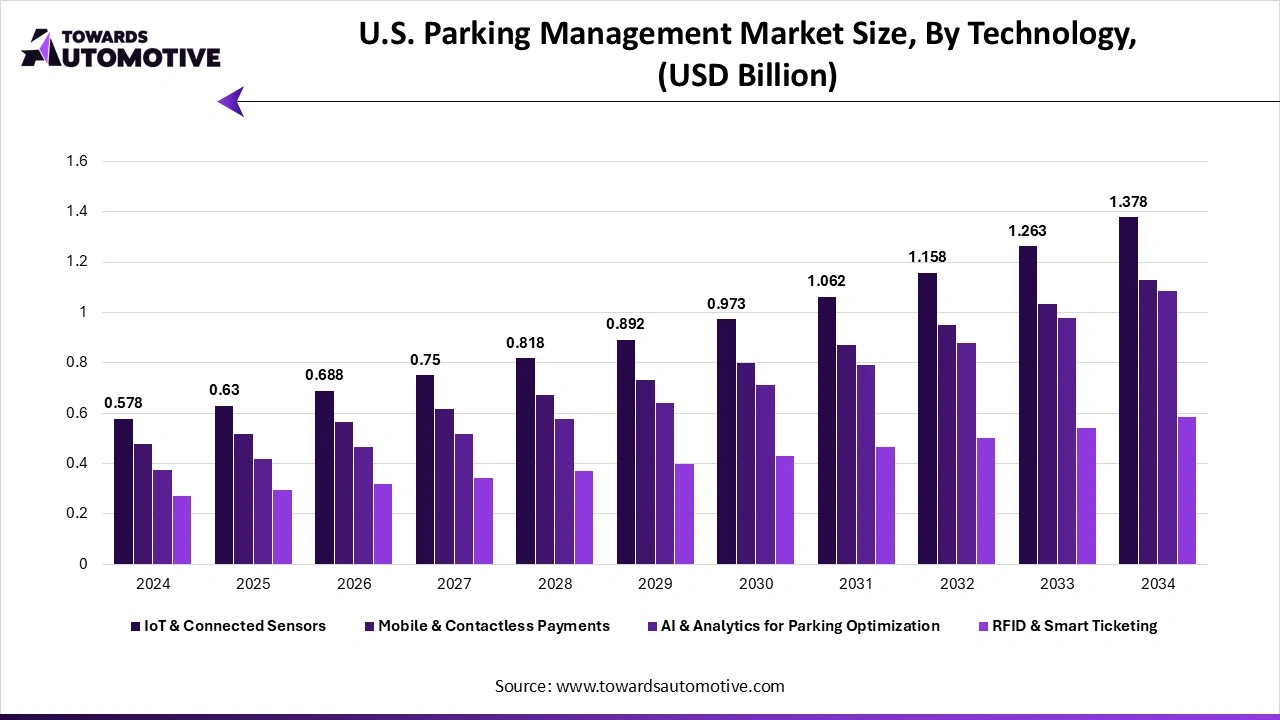
The IoT & connected sensors segment dominated the U.S. parking management market as sensors provide real-time occupancy, traffic flow, and direction to available parking spots through apps or digital displays. Municipalities and private operators turn to IoT more than any other technology to manage curbside as efficiently and sustainably as possible, improve congestion, and collect data to inform various decisions. Additionally, the increasing use of connected sensors in parking is also tied to the smart city movement in many U.S. cities. Parking operators adopting IoT and connected sensors utilize the emerging data as it becomes available to optimize pricing, enforcement, and ease of customer use. The reliability and widespread adoption of IoT and connected sensors made the IoT & sensors segment dominate the market in the U.S.
The AI & analytics for parking optimization segment is expected to grow at the fastest rate in the U.S. parking management market because they help operators shift toward predictive management instead of manual monitoring. AI is being leveraged in the U.S. to predict demand, set dynamic pricing, and optimize parking space utilization. Analytics are useful to cities because they can provide a greater understanding of how usage is occurring and better plan for urban infrastructure needs. AI-supported license plate recognition and traffic monitoring are also enhancing security operations. In summary, as there is increased demand for automation and using data to make decisions, it is expected that AI and analytics will grow at the fastest rate in the U.S. parking management market.
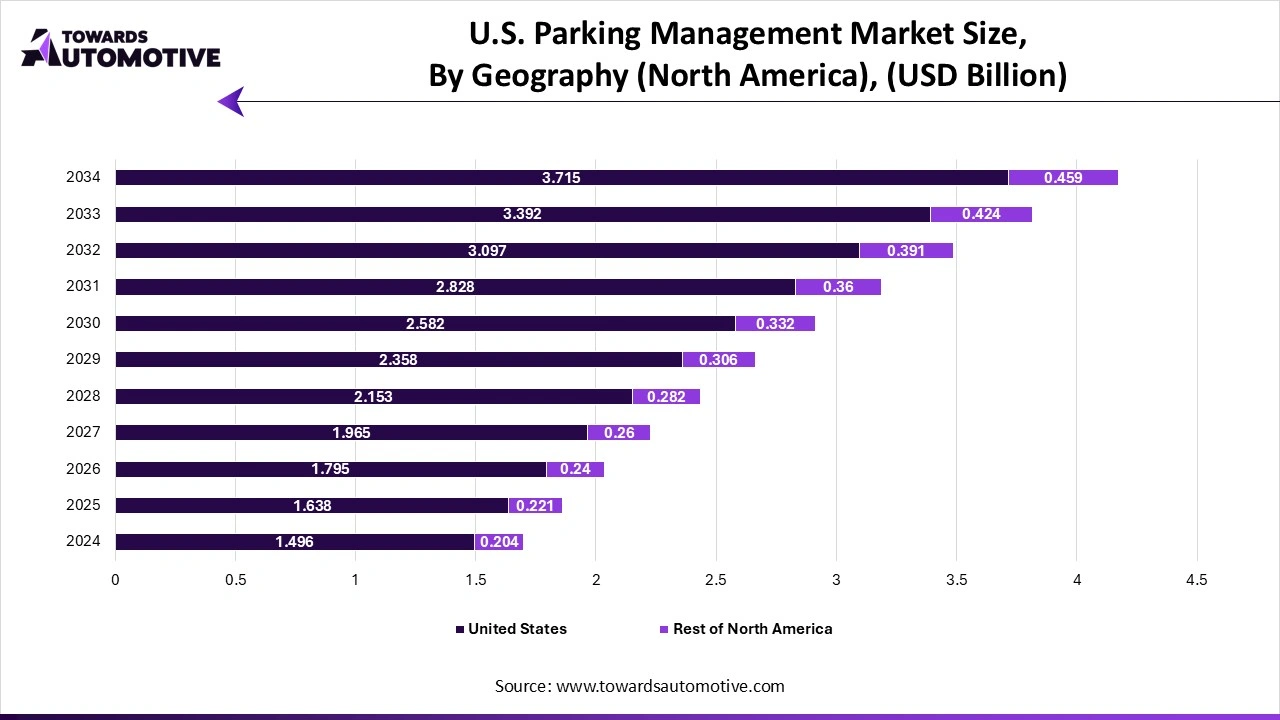
The western region has the largest share of the U.S. parking management market because it contains some of the busiest and most crowded cities, such as Los Angeles, San Francisco, Seattle, and San Diego. These cities have significant parking issues related to limited land space and substantial car ownership, creating a strong market for enhanced parking solutions. Further, the West tends to adopt new technology, including IoT sensors, AI systems, and mobile applications, resulting in the evolution of parking being more intelligent and efficient. In addition, the use of electric vehicles in states such as California contributes to the western region's parking market share, as there is a large need for parking facilities that can accommodate electric charging stations. The western region will continue to lead the parking management market due to numerous smart city projects, substantial investment levels, and increasing demand for travel.
The parking management sector in the Northeast region of the United States, in cities such as New York, Boston, or Philadelphia, is expected to grow at a considerable rate. The older design of the cities and extreme parking limited space in the Northeast, which will create a demand for parking management solutions. Cities are employing pay-by-plate for the meters, mobile payments, and license plate recognition technology to help with high traffic and high turnover. New York City is using a smart curb program to help manage loading zones and alleviate congestion. Additionally, the need is deepened by the massive increase in EV drivers in states like New York and Massachusetts, where operators are installing EV chargers in the parking spaces. All of these aspects will create steady growth for the parking management solution in the Northeast.
| October 2024 | Announcement |
| Bob Andrews, founder of Zevtron. | This partnership is great news for parking owners who rely on PCI to manage their parking facilities, as well as EV drivers who park in those garages and lots. PCI is one of the most successful and innovated parking operators in the United States and their field support infrastructure is outstanding. Through this partnership, parking owners who work with PCI now have access to the industry’s best EV charging solution. |
| February 2025 | Announcement |
| Director, Physical Security and Parking, Mercedes-Benz Stadium, Eric Young. | Our goal is to deliver a seamless and welcoming experience for every fan who visits Mercedes-Benz Stadium. Partnering with ParkHub allows us to enhance the parking process, ensuring that this critical first step of a fan’s journey is as smooth and efficient as possible. Their innovative technology and dedication to customer service were key factors in our decision and we look forward to a successful partnership. |
| January | Announcement |
| Anthony Eskinazi, Founder of JustPark. | Our expansion into the US marks an exciting new chapter for JustPark. The UK remains our heartland, where we’ve pioneered smarter, user-friendly parking solutions for millions of drivers and businesses. Now, we’re bringing our proven technology to North America, starting with the University of Hawai’i. This partnership demonstrates our global ambitions and underlines our commitment to delivering exceptional and stress-free parking experiences wherever drivers need them. |
| Date | Announcement |
| Ryan Manion, Director of Growth at Orbility USA. | Orbility is tripling down on its commitment to our dealer network,We’re offering the tools, resources, and motivation our partners need to thrive in today’s rapidly evolving mobility landscape. |
The U.S. parking management market is highly competitive. Some of the prominent players in the market are Amano McGann, Inc., Cale America Inc., Conduent Incorporated, Cubic Corporation, FlashParking, Inc., Flowbird Group, HUB Parking Technology, IPS Group, Inc., ParkMobile, LLC, Parkeon / Flowbird (U.S. operations), Skidata, Inc., SP Plus Corporation, TIBA Parking Systems, Amano Pioneer Eclipse, and FlashParking / Passport Inc. These companies are utilizing multiple approaches to gain a competitive advantage in the U.S. parking management market. They are acquiring or merging with other companies to expand their geographic coverage and reduce the time required to secure contract awards. They are also entering partnerships with municipalities, developers, airports, and transportation hubs to integrate their systems into new construction or retrofit projects. Moreover, many companies are making significant investments in technology such as mobile applications, license-plate recognition, real-time sensors, cloud-based platforms, and contactless payment systems. In addition, these companies are also making improvements to the user experience with much faster entry/exit, pre-booking, reservation systems, and dynamic pricing. They are also differentiating themselves by providing analytics, maintenance services, and full-service operation (including enforcement and customer support) to lock in their clients.
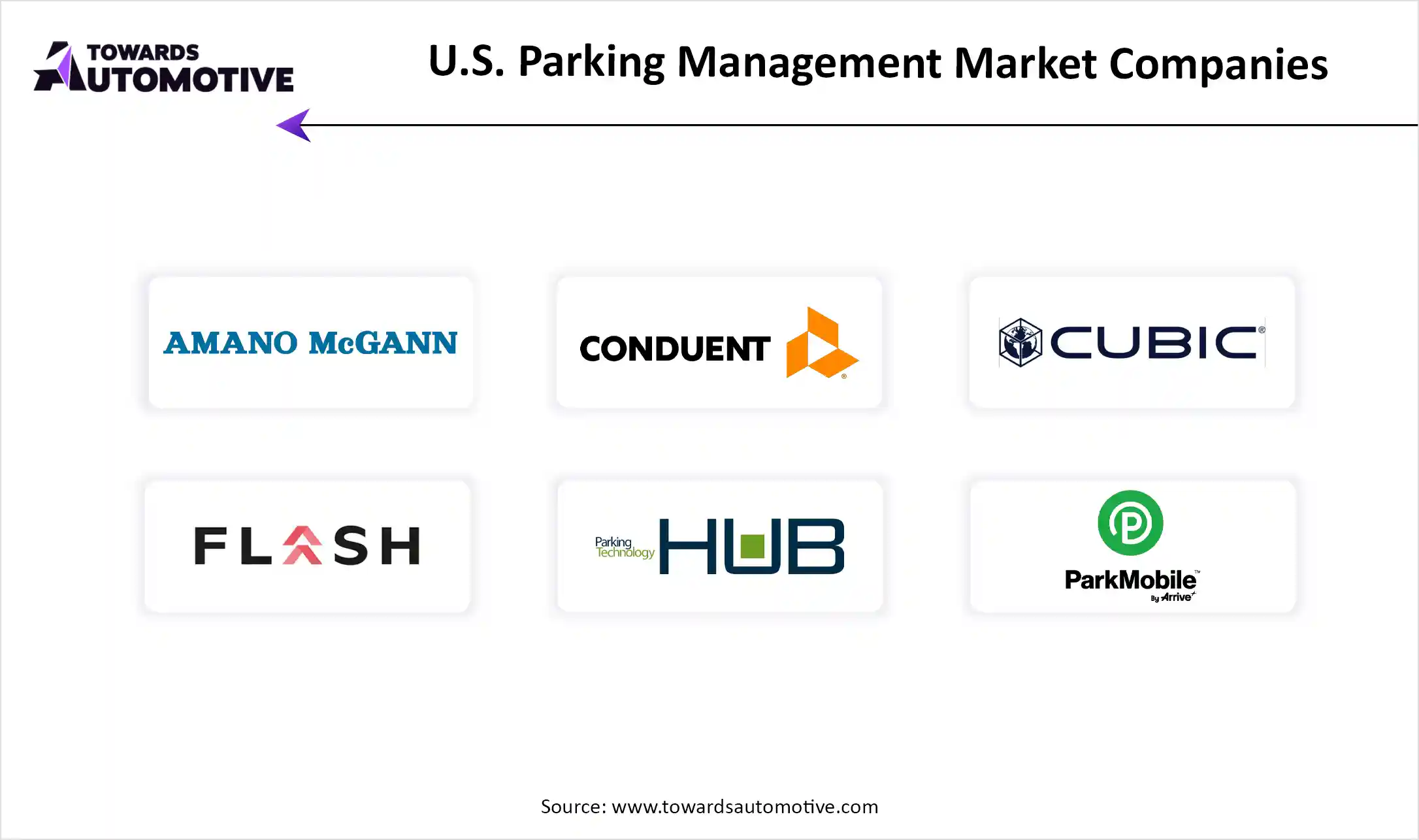
Tier 1
Tier 2
Tier 3
By Component
By Parking Type
By Solution Type
By End-User
By Deployment Type
By Technology
By Geography
September 2025
September 2025
October 2025
October 2025
We offer automotive expertise for market projections and customizable research, adaptable to diverse strategic approaches.
Contact Us